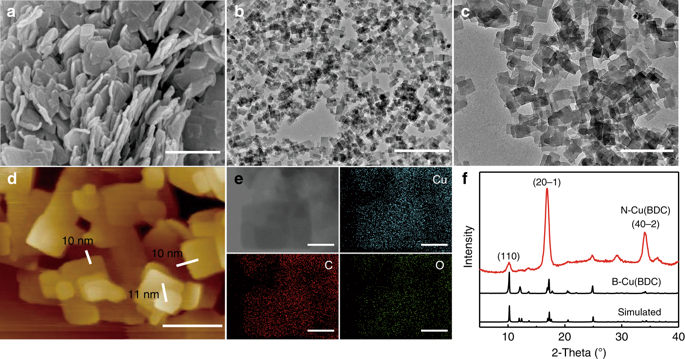Nature Communications ( IF 14.7 ) Pub Date : 2020-03-18 , DOI: 10.1038/s41467-020-15200-4 Fanyu Zhang , Jianling Zhang , Bingxing Zhang , Lirong Zheng , Xiuyan Cheng , Qiang Wan , Buxing Han , Jing Zhang

|
The production of 2D metal-organic frameworks (MOFs) with highly exposed active surfaces is of great importance for catalysis. Here we demonstrate the formation of MOF nanosheets by utilizing CO2 as a capping agent to control the oriented growth of MOF. This strategy has many advantages over the conventional methods. For example, it is template-free and proceeds at mild temperature (35 °C), CO2 can be easily removed by depressurization, and the properties of the MOF nanosheets can be well adjusted by changing CO2 pressure. Such a simple, rapid, efficient and adjustable route produces MOF nanosheets with ultrathin thickness (∼10 nm), small lateral size (∼100 nm) and abundant unsaturated coordination metal sites on surfaces. Owing to these unique features, the as-synthesized MOF nanosheets exhibit superior activity for catalyzing the oxidation reactions of alcohols.
中文翻译:

CO 2通过高度可及的活性位点控制金属有机骨架的定向生长
具有高度暴露的活性表面的二维金属有机骨架(MOF)的生产对于催化非常重要。在这里,我们演示了利用CO 2作为封盖剂来控制MOF定向生长的MOF纳米片的形成。与常规方法相比,此策略具有许多优点。例如,它不含模板,可在温和的温度(35°C)下进行,可通过减压轻松除去CO 2,并可通过更改CO 2压力很好地调节MOF纳米片的性能。这种简单,快速,有效且可调整的方法可生产出具有超薄厚度(〜10 nm),横向尺寸小(〜100 nm)和表面上的大量不饱和配位金属位点。由于这些独特的功能,合成后的MOF纳米片具有出色的催化醇氧化反应的活性。































 京公网安备 11010802027423号
京公网安备 11010802027423号